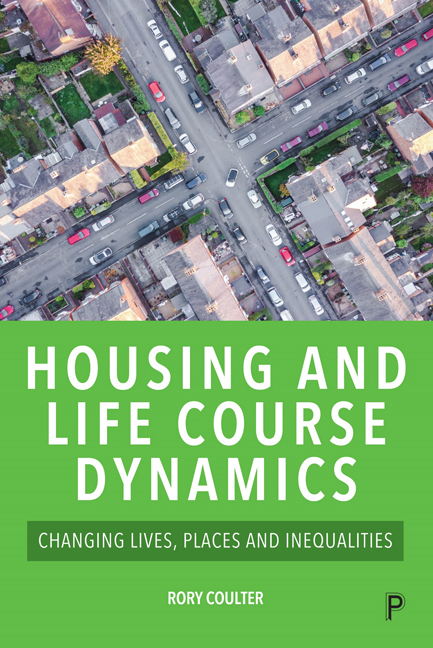Book contents
- Frontmatter
- Dedication
- Contents
- List of figures and tables
- List of abbreviations
- Notes on the author
- Acknowledgements
- Preface
- 1 Introduction
- 2 Housing: a life course perspective
- 3 Households and families
- 4 Learning and training
- 5 Employment and money
- 6 Health, well-being and care
- 7 Changing places
- 8 Understanding housing and life course dynamics
- Notes
- References
- Index
6 - Health, well-being and care
Published online by Cambridge University Press: 18 January 2024
- Frontmatter
- Dedication
- Contents
- List of figures and tables
- List of abbreviations
- Notes on the author
- Acknowledgements
- Preface
- 1 Introduction
- 2 Housing: a life course perspective
- 3 Households and families
- 4 Learning and training
- 5 Employment and money
- 6 Health, well-being and care
- 7 Changing places
- 8 Understanding housing and life course dynamics
- Notes
- References
- Index
Summary
How housing is thought to relate to health has long influenced urban policy and the COVID-19 pandemic provided a powerful reminder of just how important these connections still are in the 21st century. Recent research shows that housing conditions directly influenced health through the pandemic as patterns of physical vulnerability and viral transmission were influenced by household structures, dwelling characteristics and neighbourhood attributes such as population density (Tinson and Clair, 2020). COVID-19 lockdowns also threw into sharp relief the more indirect ways housing shapes well-being as having space to work or study at home, access to outdoor space and supportive relationships with neighbours, all became important psychological resources. The pandemic's wake thus seems a timely moment to take a fresh look at how housing and health are interwoven across contemporary life courses.
Housing, public health and the life course
Recognition that housing is a health issue in need of significant government attention can be traced back to the British state's first systematic public health interventions in the mid-1800s (Lund, 2017). In the early Victorian era, many social reformers and paternalistic industrialists sought to publicise and tackle the squalor and disease they saw in the unplanned areas of dense, poorly built housing that had sprung up in Britain's growing industrial cities. Often their concern for the health of the working-classes was not simply altruistic as many believed that poor living conditions undermined the nation's spiritual well-being and the population's fitness for hard work and imperial service. In response, a succession of parliamentary Acts were passed from the 1840s to gradually improve working-class housing conditions through municipal sanitation, regulation of dwelling standards and, later, through clearance programmes and public housing provision. Growing acceptance that housing is a health issue thus catalysed the development of housing policy and helped shape Britain's emerging welfare state and system of local governance (Lund, 2017).
Today, the relevance of housing to health is seen in a more nuanced light. Shaw (2004) argues this is partly because the links between these domains change as societies develop and progress through the epidemiological transition.
- Type
- Chapter
- Information
- Housing and Life Course DynamicsChanging Lives, Places and Inequalities, pp. 123 - 143Publisher: Bristol University PressPrint publication year: 2023



